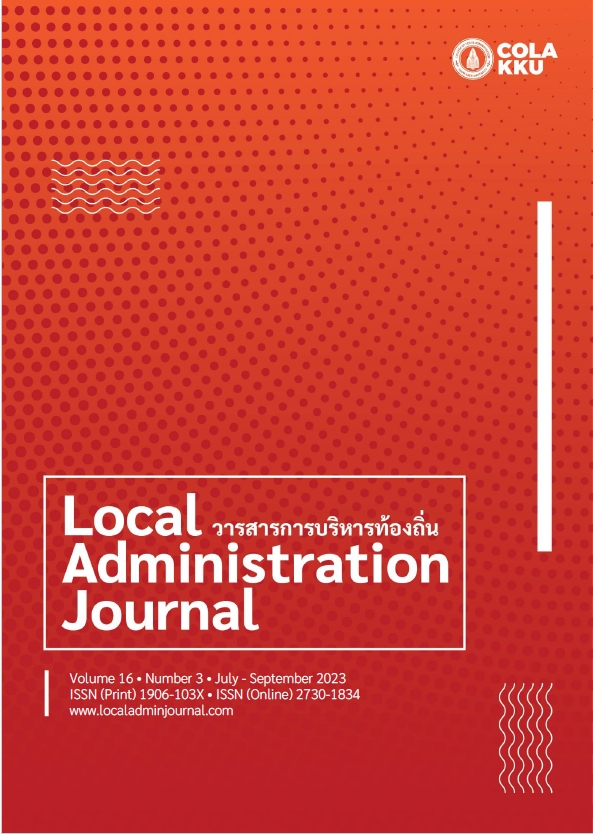Development and Use of Big Data in Tax Collection and Public Service Planning: A Case of Krabi Provincial Administrative Organization
Keywords:
Big data strategy, tax collection planning, local public services, provincial administrative organizationAbstract
The development and use of big data in local tax administration and service provision have been a point of concern for over a decade. However, real cases of big data utilization in major local governments such as Provincial Administrative Organization (PAO) are rare. This paper attempts to develop guidelines for big data development based on Krabi PAO's case in administering hotel tax collection and preparing basic public facilities for tourists. The objectives of this research are (1) to study the model of developing an extensive database for planning, administration, tax collection, and public service provision for the Provincial Administrative Organization, and (2) to present guidelines for utilizing large databases in planning hotel tax collection and provision of essential public services for provincial administrative organizations. This research found that big data systems developed and compiled from multiple databases fulfilled the limitation of existing official data and reflected the opportunity for revenue enhancement of Krabi PAO from the hotel tax. Moreover, they provide analytical data for elevating the tourism capabilities of Krabi Province in terms of diversifying types of transport networks and providing essential public services related to tourist attractions, welfare, and public safety. This research suggests that local administrative organizations employ big data management in designing local development policies for effective local services. In this regard, data managers must establish guidelines for specific purposes and clearly define the objectives in the development of local information systems. It is expected that this research endeavor sheds light on the future development and utilization of local government big data in the long run.
References
Al-Badia, A., Tarhinia, A. & Khana, A. I. (2018). Exploring Big Data Governance Frameworks. Procedia Computer Science, 141, 271 - 277.
Department of Local Administration, Thailand. (2021). Income Data of Local Government Organizations for the Fiscal Year 2021. Bangkok: Department of Local Administration, Ministry of Interior, Thailand. (in Thai)
Gillis, A. S. (2020). Internet of Things (IoT). TechTarget: IoT Agenda. (Access in 2020, April 21). Retrieved from https://internetofthingsagenda.techtarget.com/definition/Internet-of-Things-IoT
Khan, N., Alsaqer, M., Shah, H., Badshah, G., Abbasi, A. A. & Salehian, S. (2018). The 10 Vs, Issues and Challenges of Big Data. In ICBDE 18: Proceedings of the 2018 International Conference on Big Data and Education (pp. 52 - 56). New York, New York: Association for Computing Machinery.
Kiattikomol, P. & Kecharananta, N. (2008). Information System for Decision Making. Bangkok: Sor. Asia Press. (in Thai)
Krueathep, W. & Chaicharoen, S. (2021). Analyses of Hotel Tax Revenue Potentials: A Case of Provincial Administrative Organizations. Local Administration Journal, 14(1), 19 - 36. (in Thai).
Krueathep, W., et al. (2020). Final Research Report: Enhancing Capabilities of Local Revenue Administration in Thailand. Bangkok: Thailand Science Research and Innovation. (in Thai).
Krueathep, W., et al. (2022). Final Research Report: Enhancing Capabilities of Local Revenue Administration in Thailand (Phase II Study). Bangkok: National Research Council of Thailand. (in Thai).
Laney, D. B. (2017). Infononics: How to Monetize, Manage, and Measure Information as an Asset for Competitive Advantage. New York, New York: Routledge.
Numnonda, T. (August 26, 2020). Big Data Project Process. Thananchart.org. Retrieved from https://thanachart.org/2018/05/03. (in Thai).
Pattamasiriwat, D., et al. (2021, December 17). Balance, Discretion: Learning the City from the Tax Map, A Case Study of Mae Hia Town Municipality, Chiang Mai, Thailand. Matichon Online. Retrieved from https://www.matichon.co.th/article/news_3088785. (in Thai).
Thailand Development Research Institute. (2021). Information System and Government SMART. TDRI Report, 174, 1 - 8. (in Thai).
Downloads
Published
How to Cite
Issue
Section
License
Copyright (c) 2023 Local Administration Journal

This work is licensed under a Creative Commons Attribution-NonCommercial-NoDerivatives 4.0 International License.
The copyright of all articles published in the Local Administration Journalis owned by the College of Local Administration, Khon Kaen University.



